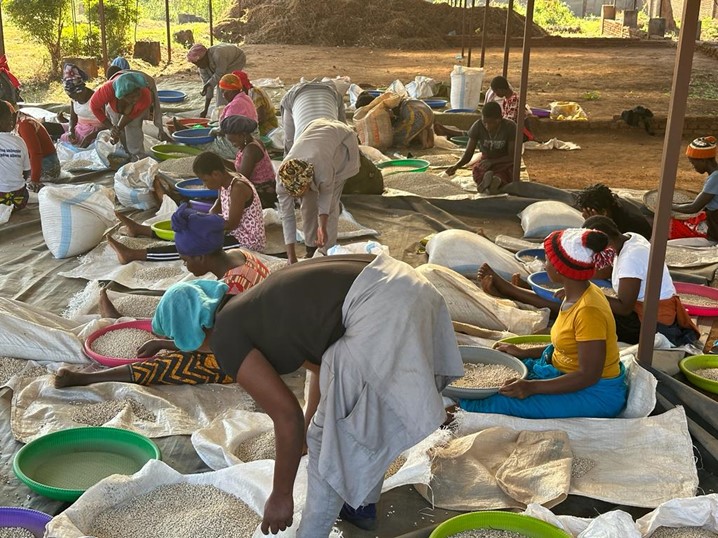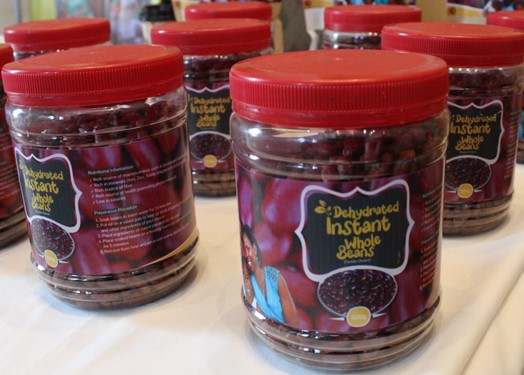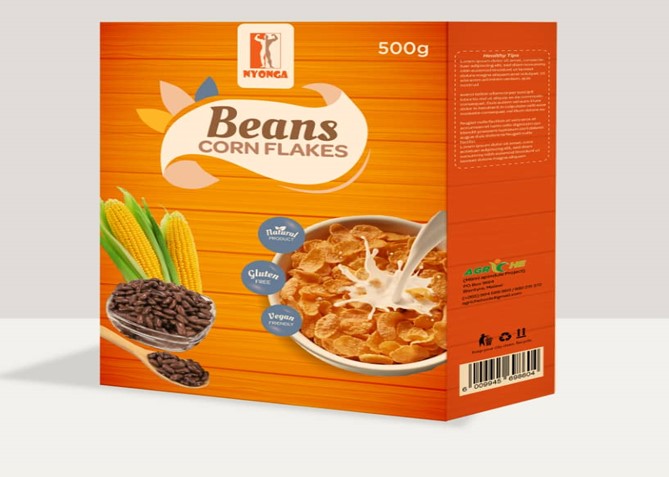One of the products from beans in the pipeline: Picture courtesy of Mwaiwawo Kukada
Despite a pool of challenges, such as resistance by some consumers in Malawi to embrace locally made processed foods and cumbersome procedures to get Malawi Bureau of Standards certification, Mwaiwawo Kukada kept his head high to chase his dreams.
From 2017 when he started his company Agriche as an agro-dealer, Kukada quickly saw another existing and untapped opportunity in agro-food processing. He did not have a worst time but immediately ventured into processing food products from legumes, such as ground nuts and soybeans.
“Initially, I was only selling chemicals and other farm inputs to rural farmers. I chose to target only those in rural areas because I saw that it was so difficult for them to access such materials. Immediately, I realized that farmers also lack reliable markets for their produce, so I thought of venturing into agro-food processing to create a market for their legumes and I started making flour from groundnuts and soybeans,” he says.
In 2022, Kukada was invited to a “Gender in Agro-food Processing Workshop” in Lilongwe, Malawi organized by the Alliance of Bioversity International and CIAT through the Feed the Future Innovation Lab for Legumes Systems Research’s project called “Improving incomes and nutrition security through development and commercialization of consumer preferred processed legume-based products in Malawi and Zambia”. During the workshop, Kukada was intrigued by the project’s work on promotion and utilization of beans to various food products. He acknowledged that in Malawi, most people consume common beans as relish after boiling.
He was inquisitive in learning other ways of utilizing beans. Later, he decided to start processing composite flours by mixing bean flour with flour from other cereals and legumes. His desire, he says, is to see more Malawians start preparing porridge frequently using bean flour, just as it is the case with maize, soya, and groundnuts flours.
With thorough thought, he decided to go beyond the products that were suggested by the project and produced different products. Currently, the Blantyre City-based entrepreneur has produced his own food product protypes, namely bean-cornflakes and bean noodles to add to his production.
“I realized that it is possible to turn beans into flakes and create demand for it. So, it was a matter of adding value to the same common beans by turning them into other forms of products for people to consume. We are planning to produce more products apart from the flour and flakes.
“We are already in the process of making chocolate and vanilla-flavoured flakes. We want people to be consuming flakes based on preferences. For the noodles, the idea is that in terms of nutrition it should benefit a lot of children in schools,” explains Kukada.
Training, exposure and linkages
The Agriche Founder admits that his dreams would not have been easy to pursue if not for the helping hand of different stakeholders such as the Alliance of Bioversity International and International Center for Tropical Agriculture (CIAT) through different projects.
The projects were, “Transforming seed systems to respond to bean variety demand through Multi-stakeholder Platforms in Malawi” and “Improving income and nutrition security through development and commercialization of consumer preferred processed legume-based products in Malawi and Zambia,” managed by the Feed the Future Innovation Lab for Legume Systems Research and funded by USAID.
 Bean grading at an Agro processing plant. The MSP has opened up the bean value chain in Malawi from seed to table – Picture Jean Claude Rubyogo
Bean grading at an Agro processing plant. The MSP has opened up the bean value chain in Malawi from seed to table – Picture Jean Claude Rubyogo
He is therefore so confident of excelling and flooding the local market with different locally made foodstuffs from beans because of the exposure, linkages and manufacturing training and research dissemination workshops he received and attended locally and internationally.
“The Alliance has given me a platform to learn and meet different people, locally and internationally. Furthermore, experts from the Lilongwe University of Agriculture and Natural Resources (LUANAR), Malawi Bureau of Standards (MBS) and Department of Agricultural Research Services (DARS) have been instrumental in building my capacity, for instance, LUANAR has been helping me with formulations of my products to contain right and adequate nutritional values. While we are producing new products, it is also important that we ensure that the products contain the right nutritional values through the process of optimization. Such is the case because we want to create products that contain balanced nutrients to suffice proper functioning of a human body,” he adds.
Consumers’ trust on locally made products
Due to worsening levels of trade imbalance brought in by continued hunger for imported goods among many Malawians, the Government of Malawi launched the Buy Malawi Strategy in 2016.
This was meant to encourage consumption of locally produced goods and services, to create necessary conditions for inclusive and sustainable economic growth, through enhancement of competitiveness of local firms, stimulation of local production and promotion of industrialization.
According to Kukada, despite continued attempts to create awareness for Malawians to start embracing locally made products, most of them still opts for imported products, partly because of issues of mistrust and generalized negative mindsets.
“But I belief and I know for sure that there is an opportunity for us to grow and reverse the status quo because people will learn and trust us and embrace these new products. It is encouraging that by and by many are willing to try and once they do they become fond of these products. I am also targeting institutional buyers, for example, the porridge from bean flour can be consumed in schools and hospitals. These institutions are already consuming porridge from other cereals and legumes and this bean-based flour will add diversity to the menu.
“If such institutions can start purchasing from, it means I will be among the first person to be associated with this product and that will create a brand name for me and boost my market reach due to trust,” Kukada states.
Challenges to be addressed
Just like majority of agro-food processors in Malawi, Agriche is hampered by lack of raw materials and no access to finances to boost its capacity to expand.
Kukada suggests that supporting farmers across the country to grow more modern bean varieties can go a long way in addressing supply chain gaps.
“We need to inform farmers to grow more biofortified beans like NUA 45. [Currently] there are few that are cultivating this type of beans that are rich in iron and zinc. Once we address this, we can expand productivity, while on the other hand, farmers will also be making more returns on their investment,” hints Kukada.
 A sample of dehydrated instant whole beans. Through Value addition, bean products in Malawi are now in supermarkets and shops – Picture courtesy of Yohane Chideya
A sample of dehydrated instant whole beans. Through Value addition, bean products in Malawi are now in supermarkets and shops – Picture courtesy of Yohane Chideya
Smith Nkhata is a Lecturer specialized in food technology and nutritional sciences at LUANAR and testifies to this assertion. He attests that despite the capacity for Small and Medium Enterprises to make it big in the food processing sector in Malawi, there is need to address hiccups in the supply chain by making beans easily available and accessible.
“Let us make beans readily available and cheaper to make agro-food processing easy for local entrepreneurs,” he says.

